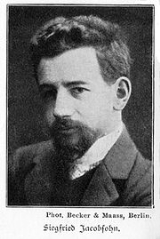
Siegfried Jacobsohn
Encyclopedia
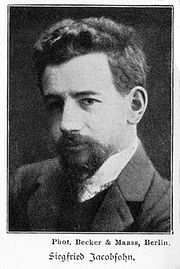
Germany
Germany , officially the Federal Republic of Germany , is a federal parliamentary republic in Europe. The country consists of 16 states while the capital and largest city is Berlin. Germany covers an area of 357,021 km2 and has a largely temperate seasonal climate...
writer and influential theatre critic.
Life
Born in BerlinBerlin
Berlin is the capital city of Germany and is one of the 16 states of Germany. With a population of 3.45 million people, Berlin is Germany's largest city. It is the second most populous city proper and the seventh most populous urban area in the European Union...
into a Jewish family, Jacobsohn decided at the age of 15 to become a theatre critic. In October 1897 he left school without gaining any diplomas and began studying at Friedrich-Wilhelm-University
Humboldt University of Berlin
The Humboldt University of Berlin is Berlin's oldest university, founded in 1810 as the University of Berlin by the liberal Prussian educational reformer and linguist Wilhelm von Humboldt, whose university model has strongly influenced other European and Western universities...
as it was then called. At the time it was still possible to gain entrance to university without any formal qualification. Among his teachers at university were Erich Schmidt
Erich Schmidt
Erich Friedrich Schmidt was a German and American-naturalized archaeologist, born in Baden-Baden. He specialized in Ancient Near East Archaeology, and became professor emeritus at the Oriental Institute of the University of Chicago.When he was young, he fought in the World War I, and was captured...
, Ulrich von Wilamowitz-Moellendorff
Ulrich von Wilamowitz-Moellendorff
Enno Friedrich Wichard Ulrich von Wilamowitz-Moellendorff was a German Classical Philologist. Wilamowitz, as he is known in scholarly circles, was a renowned authority on Ancient Greece and its literature.- Youth :...
and Max Herrmann
Max Herrmann
Max Herrmann was a German literary historian and theorist of theatre studies. He is considered to be the founding father of theatre studies in Germany....
. However, he seemed to have learnt more by studying critiques written by Maximilian Harden
Maximilian Harden
Maximilian Harden was an influential German journalist and editor.- Biography :...
, Fritz Mauthner
Fritz Mauthner
Fritz Mauthner was a journalist and philosopher from Horschitz, Bohemia.He became editor of the Berliner Tageblatts in 1895, but is best known for his Beiträge zu einer Kritik der Sprache , published in three parts in 1901 and 1902...
and Paul Schlenther, the critiques of whom were exemplary to him. He also consulted actors such as Albert Bassermann
Albert Bassermann
Albert Bassermann was a German stage and screen actor.-Career:Bassermann began his acting career in 1887 in his birthplace, Mannheim. He then spent four years at the Hoftheater in Meiningen. He then moved to Berlin. From 1899, he worked for Otto Brahm. He began work at the Deutsches Theater...
, Jakob Tiedtke
Jakob Tiedtke
Jakob Tiedtke was a German film actor. He appeared in 194 films between 1914 and 1955.-Selected filmography:* The Doll * Sumurun * Kohlhiesels Töchter * The Expulsion...
and Richard Leopold.
When he was still a student, Jacobsohn was hired by Hellmut von Gerlach
Hellmut von Gerlach
Hellmut Georg von Gerlach was a German journalist and politician.-Life:Hellmut von Gerlach, the son of landowner Max von Gerlach, was born in Mönchmotschelnitz in Silesia. He studied law at the universities of Gent, Strasbourg, Leipzig, and Berlin, and was a member of the Verein Deutscher Studenten...
as a theatre critic for the Berlin weekly Die Welt am Montag. In an interview with the Frankfurter Zeitung
Frankfurter Zeitung
The Frankfurter Zeitung was a German language newspaper that appeared from 1856 to 1943. It emerged from a market letter that was published in Frankfurt...
published on 8 November 1926, von Gerlach remembered that this sapling had spent literally every evening of his school days at the theatre. He knew every actor in every part and he knew the complete stage literature. Accompanied by an accurate sense of judgment hardly to be imagined by someone of his age. It was a phenomenon.
His first contribution in Die Welt am Montag was published in March 1901. In June 1902 he became editor
Editing
Editing is the process of selecting and preparing written, visual, audible, and film media used to convey information through the processes of correction, condensation, organization, and other modifications performed with an intention of producing a correct, consistent, accurate, and complete...
of the magazine, his contract lasting for three years. In September 1902 he also assumed the role of theatre critic in Berlin for the Viennese
Vienna
Vienna is the capital and largest city of the Republic of Austria and one of the nine states of Austria. Vienna is Austria's primary city, with a population of about 1.723 million , and is by far the largest city in Austria, as well as its cultural, economic, and political centre...
daily Die Zeit.
Jacobsohn distinguished himself quickly as a harsh critic of dilettantism on the stage, and did not shrink from attacking the Berliner Tageblatt
Berliner Tageblatt
The Berliner Tageblatt or BT was a German language newspaper published in Berlin from 1872-1939. Along with the Frankfurter Zeitung, it became one of the most important liberal German newspapers of its time.-History:...
as a "seat of artistic corruption" in the controversy surrounding Hermann Sudermann
Hermann Sudermann
Hermann Sudermann was a German dramatist and novelist.- Early career :He was born at Matzicken, a village just to the east of Heydekrug in the Province of Prussia , close to the Russian frontier...
's polemic Die Verrohung in der Theaterkritik (The Brutalisation of Theatre Criticism) in 1902. Two years later the editors of the feuilleton
Feuilleton
Feuilleton was originally a kind of supplement attached to the political portion of French newspapers, consisting chiefly of non-political news and gossip, literature and art criticism, a chronicle of the latest fashions, and epigrams, charades and other literary trifles...
at the Berliner Tageblatt took revenge by accusing Jacobsohn of plagiarism
Plagiarism
Plagiarism is defined in dictionaries as the "wrongful appropriation," "close imitation," or "purloining and publication" of another author's "language, thoughts, ideas, or expressions," and the representation of them as one's own original work, but the notion remains problematic with nebulous...
in two cases. Jacobsohn explained the similarities of his texts with those of the theatre critic Alfred Gold that following working on his book Das Theater der Reichshauptstadt (The Theatre of the Imperial Capital) in his memory there "slumbered words, images, sentences and whole paragraphs of other authors, memories that could be awakened by the slightest association." Even though Maximilian Harden and Arthur Schnitzler
Arthur Schnitzler
Dr. Arthur Schnitzler was an Austrian author and dramatist.- Biography :Arthur Schnitzler, son of a prominent Hungarian-Jewish laryngologist Johann Schnitzler and Luise Markbreiter , was born in Praterstraße 16, Leopoldstadt, Vienna, in the Austro-Hungarian...
spoke up for Jacobsohn since they did not believe in plagiarism in view of similarities with regards to common place expression, Jacobsohn was fired by Die Welt am Montag.
Following a journey through Europe lasting for several months during which he visited Vienna, Rome
Rome
Rome is the capital of Italy and the country's largest and most populated city and comune, with over 2.7 million residents in . The city is located in the central-western portion of the Italian Peninsula, on the Tiber River within the Lazio region of Italy.Rome's history spans two and a half...
and Paris
Paris
Paris is the capital and largest city in France, situated on the river Seine, in northern France, at the heart of the Île-de-France region...
he returned to Berlin planning to establish a theatre magazine. The first edition of this magazine solely specialised in the theatre was published on 7 September 1905. Jacobsohn decided to name it Die Schaubühne as a reference to Friedrich Schiller
Friedrich Schiller
Johann Christoph Friedrich von Schiller was a German poet, philosopher, historian, and playwright. During the last seventeen years of his life , Schiller struck up a productive, if complicated, friendship with already famous and influential Johann Wolfgang von Goethe...
's essay Die Schaubühne als moralische Anstalt betrachtet (The stage as a moral institution). Among the most important contributors to Die Schaubühne were Julius Bab
Julius Bab
Julius Bab was a German dramatist and theater critic.He was a cofounder of the Kulturbund Deutscher Juden. Bab was a close friend of journalist and theater critic Siegfried Jacobsohn and a key contributor to the early years of the magazine Schaubühne, the later Weltbühne.In 1939 he emigrated to...
, Willi Handl, Alfred Polgar
Alfred Polgar
Alfred Polgar was an Austrian-born journalist, one of the renowned wits of the Vienna coffeehouses. He left Austria in 1938, and later worked in Hollywood.He was known as a drama critic, in Berlin 1925 to 1933, and an essayist...
, Lion Feuchtwanger
Lion Feuchtwanger
Lion Feuchtwanger was a German-Jewish novelist and playwright. A prominent figure in the literary world of Weimar Germany, he influenced contemporaries including playwright Bertolt Brecht....
(in 1908), Herbert Ihering (in 1909), Robert Breuer (in 1911) and Kurt Tucholsky
Kurt Tucholsky
Kurt Tucholsky was a German-Jewish journalist, satirist and writer. He also wrote under the pseudonyms Kaspar Hauser, Peter Panter, Theobald Tiger and Ignaz Wrobel. Born in Berlin-Moabit, he moved to Paris in 1924 and then to Sweden in 1930.Tucholsky was one of the most important journalists of...
(in 1913).
From 1913 onwards Jacobsohn gradually opened up the "rag," as he like to call his magazine, to include political topics. In April 1918 he changed the name to Die Weltbühne
Die Weltbühne
Die Weltbühne was a German weekly magazine focused on politics, art, and business. The Weltbühne was founded in Berlin on 7 September 1905 by Siegfried Jacobsohn and was originally created strictly as a theater magazine under the title Die Schaubühne. It was renamed Die Weltbühne on 4 April 1918...
and developed it into a pacifist forum for the German Left. With the new political orientation the collaborators changed as well. Even though Alfred Polgar and Kurt Tucholsky still belonged to the inner circle of contributors, they were joined by publicist
Publicist
A publicist is a person whose job is to generate and manage publicity for a public figure, especially a celebrity, a business, or for a work such as a book, film or album...
Kurt Hiller
Kurt Hiller
Kurt Hiller also known as Keith Lurr and Klirr was a German essayist of high stylistic originality and a political journalist from a Jewish family. A socialist, he was deeply influenced by Immanuel Kant and Arthur Schopenhauer, despising the philosophy of G. W. F...
(in 1915), economist
Economist
An economist is a professional in the social science discipline of economics. The individual may also study, develop, and apply theories and concepts from economics and write about economic policy...
Alfons Goldschmidt, satirist Hans Reimann
Hans Reimann
Hans-Georg Reimann is an East German athlete, who starts for the SC Dynamo Berlin and the GDR and won two Olympic medals in 20 km racewalking at the Olympic summer games 1972 in Munich he won the third place , and at the 1976 Summer Olympics in Montréal he became the second place Hans-Georg...
(both in 1917), the founder of the German Peace Society
German Peace Society
The German Peace Society was founded in 1892. It still exists and is known as the Deutsche Friedensgesellschaft - Vereinigte KriegsdienstgegnerInnen...
Otto Lehmann-Rußbüldt (in 1918), Social-Democrat politician Heinrich Ströbel (in 1919), art critic Adolf Behne
Adolf Behne
Adolf Behne was a critic, art historian, architectural writer, and artistic activist. He was one of the leaders of the Avant Garde in the Weimar Republic....
, writer Walter Mehring
Walter Mehring
Walter Mehring was a German author and one of the most prominent satirical authors in the Weimar Republic. He was banned during the Third Reich, and fled the country.-Biographical:...
(both in 1920), editor on economic affairs Richard Lewinsohn, publicist Friedrich Sieburg (both in 1921) and as political editor Carl von Ossietzky
Carl von Ossietzky
Carl von Ossietzky was a German pacifist and the recipient of the 1935 Nobel Peace Prize. He was convicted of high treason and espionage in 1931 after publishing details of Germany's alleged violation of the Treaty of Versailles by rebuilding an air force, the predecessor of the Luftwaffe, and...
(in 1926).
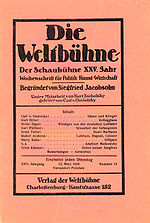
Alfred Kerr
Alfred Kerr , born Alfred Kempner, was an influential German-Jewish theatre critic and essayist, nicknamed the Kulturpapst ....
since he was a firm critic of naturalism
Naturalism (literature)
Naturalism was a literary movement taking place from the 1880s to 1940s that used detailed realism to suggest that social conditions, heredity, and environment had inescapable force in shaping human character...
in the theatre and valued the work of Max Reinhardt
Max Reinhardt
----Max Reinhardt was an Austrian theater and film director and actor.-Biography:...
as theatre director higher than that of Otto Brahm
Otto Brahm
Otto Brahm was a German drama and literary critic, theatre manager and director. His productions were noted for being accurate and realistic. He was involved in the foundation of the progressive Freie Bühne company, of which he became president and producer...
who was advocated by Kerr. However, Reinhardt's turn towards arena theatre by converting the Circus Schumann into a theatre resulting in the Großes Schauspielhaus
Großes Schauspielhaus
The Großes Schauspielhaus was a theatre in Berlin, Germany, often described as an example of expressionist architecture, designed by Hans Poelzig for theatre impresario Max Reinhardt . The structure was originally a market built by architect Friedrich Hitzig, and it retained its external, gabled...
in 1919, was strongly criticised by Jacobsohn.
After World War I, Jacobsohn promoted the work of Leopold Jessner
Leopold Jessner
Leopold Jessner was a noted producer and director of German Expressionist theater and cinema. His first film, Hintertreppe , is considered a major turning point which paved the way for the later German Expressionist experiments of German filmmakers F.W. Murnau, Fritz Lang, and G.W...
, the artistic director
Artistic director
An artistic director is the executive of an arts organization, particularly in a theatre company, that handles the organization's artistic direction. He or she is generally a producer and director, but not in the sense of a mogul, since the organization is generally a non-profit organization...
of the State Theatre in Berlin. He also followed closely the productions by Ludwig Berger
Ludwig Berger (director)
Ludwig Berger was a German film director, screenwriter and cinematographer. He directed 36 films between 1920 and 1969...
, Jürgen Fehling, Heinz Hilpert, Berthold Viertel
Berthold Viertel
Berthold Viertel , born in Vienna, Austria was a screen writer and film director.-Arrival in America:He was married to screenplay writer and actress Salka Viertel from 30 April 1918 to 20 December 1947. The pair came to Los Angeles in 1928 planning to stay for just three years...
and Erwin Piscator
Erwin Piscator
Erwin Friedrich Maximilian Piscator was a German theatre director and producer and, with Bertolt Brecht, the foremost exponent of epic theatre, a form that emphasizes the socio-political content of drama, rather than its emotional manipulation of the audience or on the production's formal...
.
Apart from the classic authors, particularly William Shakespeare
William Shakespeare
William Shakespeare was an English poet and playwright, widely regarded as the greatest writer in the English language and the world's pre-eminent dramatist. He is often called England's national poet and the "Bard of Avon"...
, Jacobsohn initially promoted authors such as Hugo von Hofmannsthal
Hugo von Hofmannsthal
Hugo Laurenz August Hofmann von Hofmannsthal ; , was an Austrian novelist, librettist, poet, dramatist, narrator, and essayist.-Early life:...
and Arthur Schnitzler
Arthur Schnitzler
Dr. Arthur Schnitzler was an Austrian author and dramatist.- Biography :Arthur Schnitzler, son of a prominent Hungarian-Jewish laryngologist Johann Schnitzler and Luise Markbreiter , was born in Praterstraße 16, Leopoldstadt, Vienna, in the Austro-Hungarian...
. However, he soon became disillusioned with neo-romantic authors. This disillusionment is seen as a major reason for his becoming politically active in 1913. He was also extremely critical regarding the stage efforts of expressionist
Expressionism
Expressionism was a modernist movement, initially in poetry and painting, originating in Germany at the beginning of the 20th century. Its typical trait is to present the world solely from a subjective perspective, distorting it radically for emotional effect in order to evoke moods or ideas...
writers. However, he made an exception for Georg Kaiser
Georg Kaiser
Friedrich Carl Georg Kaiser, called Georg Kaiser, was a German dramatist.-Biography:Kaiser was born at Magdeburg....
and Ernst Toller
Ernst Toller
Ernst Toller was a left-wing German playwright, best known for his Expressionist plays and serving as President of the short-lived Bavarian Soviet Republic, for six days.- Biography :...
both of whom he esteemed highly.
During the Weimar Republic
Weimar Republic
The Weimar Republic is the name given by historians to the parliamentary republic established in 1919 in Germany to replace the imperial form of government...
, Jacobsohn belonged to the few critics who immediately saw the potential of Bertolt Brecht
Bertolt Brecht
Bertolt Brecht was a German poet, playwright, and theatre director.An influential theatre practitioner of the 20th century, Brecht made equally significant contributions to dramaturgy and theatrical production, the latter particularly through the seismic impact of the tours undertaken by the...
, Arnolt Bronnen
Arnolt Bronnen
Arnolt Bronnen was an Austrian playwright and director.Bronnen's most famous play is the Expressionist drama Parricide ; its première production is notable, among other things, for being that from which Bronnen's friend, the young Bertolt Brecht in an early stage of his directing career, withdrew,...
and Carl Zuckmeyer even though he was already plagued by theatre fatigue.
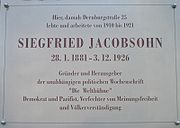
Richard Wagner
Wilhelm Richard Wagner was a German composer, conductor, theatre director, philosopher, music theorist, poet, essayist and writer primarily known for his operas...
Klaus Pringsheim even though Jacobsohn was a resolutely opposed to Wagner.
Towards the end of World War I, Jacobsohn became politically closer to the socialist USPD
Independent Social Democratic Party of Germany
The Independent Social Democratic Party of Germany was a short-lived political party in Germany during the Second Reich and the Weimar Republic. The organization was established in 1917 as the result of a split of left wing members of the Social Democratic Party of Germany...
. In 1918 he became briefly involved in the Rat der geistigen Arbeiter (Council of Intellectual Workers) founded by Kurt Hiller. However, he left this organisation shortly afterwards as it seemed more important to him to concentrate his efforts on Die Weltbühne. He also did not wish that political parties would make demands of him. Furthermore, he fundamentally abhorred dogmatic positions. Jacobsohn had no qualms to socialise with people such as Oskar von Hindenburg
Oskar von Hindenburg
Generalleutnant Oskar von Beneckendorff und von Hindenburg was the politically powerful son and aide-de-camp to Field Marshal and President of Germany Paul von Hindenburg....
, the son of the future President of Germany Paul von Hindenburg
Paul von Hindenburg
Paul Ludwig Hans Anton von Beneckendorff und von Hindenburg , known universally as Paul von Hindenburg was a Prussian-German field marshal, statesman, and politician, and served as the second President of Germany from 1925 to 1934....
, and noted reactionary. Jacobsohn reported these contacts to Tucholsky at Paris and when Tucholsky intensified his attacks on the then President of Germany Friedrich Ebert
Friedrich Ebert
Friedrich Ebert was a German politician of the Social Democratic Party of Germany .When Ebert was elected as the leader of the SPD after the death of August Bebel, the party members of the SPD were deeply divided because of the party's support for World War I. Ebert supported the Burgfrieden and...
, a (Social Democrat
Social Democratic Party of Germany
The Social Democratic Party of Germany is a social-democratic political party in Germany...
), by calling him a "traitor of his class". Jacobsohn replied in 1924 that Tucholsky should lay off Ebert since, under his successor, he would be yearning for the return of Ebert. He also remarked that Ebert had succeeded in the dissolution of the Reichstag
Reichstag (Weimar Republic)
The Reichstag was the parliament of Weimar Republic .German constitution commentators consider only the Reichstag and now the Bundestag the German parliament. Another organ deals with legislation too: in 1867-1918 the Bundesrat, in 1919–1933 the Reichsrat and from 1949 on the Bundesrat...
which meant that he would be with Tucholsky for some time yet and be able to pay his salary whereas under a new government Tucholsky would have to look for him and his money in a mass grave.
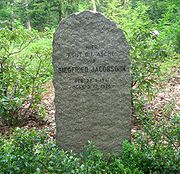
Theodor Lessing
Theodor Lessing was a German Jewish philosopher.He is known for opposing the rise of Hindenburg as president of the Weimar Republic and for his classic on Jewish self-hatred , a book which he wrote in 1930, three years before Hitler came to power, in which he tried to explain the phenomenon of...
. Jacobsohn had printed Lessing's critique of Hermann Sudermann play Der gute Ruf whereupon Sudermann went to court. After he had already fallen out with Stefan Großmann in 1918, Jacobsohn claimed in 1920 that artistic directors would pay Großmann in order to receive positive reviews for their productions. Jacobsohn had to retract in 1922. Based on a tip off by Tucholsky, Jacobsohn accused Heinrich Fischer
Heinrich Fischer
Heinrich "Heini" Fischer is a Swiss rower who competed in the 1972 Summer Olympics.In 1972 he and his partner Alfred Bachmann won the silver medal in the coxless pairs event.-External links:*...
of plagiarism in 1925. This accusation was unfounded but led to a falling out with Karl Kraus
Karl Kraus
Karl Kraus was an Austrian writer and journalist, known as a satirist, essayist, aphorist, playwright and poet. He is regarded as one of the foremost German-language satirists of the 20th century, especially for his witty criticism of the press, German culture, and German and Austrian...
. Indeed, Jacobsohn's attacks, some of which were premature since they were not verified by sufficient research, led to about 40 court cases against him. Many, but by no means all, of these court cases Jacobsohn won.
Siegfried Jacobsohn also contributed to other newspapers and magazines among which were the Deutsche Montagszeitung (Berlin), Frankfurter Nachrichten, Weser-Zeitung (Bremen
Bremen
The City Municipality of Bremen is a Hanseatic city in northwestern Germany. A commercial and industrial city with a major port on the river Weser, Bremen is part of the Bremen-Oldenburg metropolitan area . Bremen is the second most populous city in North Germany and tenth in Germany.Bremen is...
), Prager Presse, Prager Tagblatt
Prager Tagblatt
The Prager Tagblatt was a German language newspaper published in Prague from 1876 to 1939. It was considered to be the most influential liberal-democratic German newspaper in Bohemia. It stopped publication after the German invasion of Czechoslovakia...
and Zeit im Bild (Vienna).
Jacobsohn was buried in Stahnsdorf
Stahnsdorf
Stahnsdorf is a municipality in the Potsdam-Mittelmark district, in Brandenburg, Germany.-Geography:It is situated 20 km southwest of Berlin , and 12 km east of Potsdam.-History:...
, southwest of Berlin.
Kurt Tucholsky
Kurt Tucholsky
Kurt Tucholsky was a German-Jewish journalist, satirist and writer. He also wrote under the pseudonyms Kaspar Hauser, Peter Panter, Theobald Tiger and Ignaz Wrobel. Born in Berlin-Moabit, he moved to Paris in 1924 and then to Sweden in 1930.Tucholsky was one of the most important journalists of...
briefly assumed editorship of Die Weltbühne until May 1927. His task was then taken over by Carl von Ossietzky
Carl von Ossietzky
Carl von Ossietzky was a German pacifist and the recipient of the 1935 Nobel Peace Prize. He was convicted of high treason and espionage in 1931 after publishing details of Germany's alleged violation of the Treaty of Versailles by rebuilding an air force, the predecessor of the Luftwaffe, and...
until the last edition was published on 7 March 1933, when it was banned by the Nazi Party. The archives were confiscated and have subsequently disappeared without a trace.
Works
- Das Theater der Reichshauptstadt (1904)
- Max Reinhardt (1910)
- Der Fall Jacobsen (1913)
- Die ersten Tage (1917)

